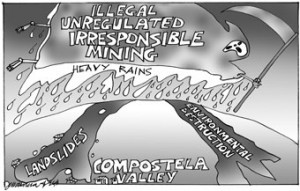Bloodbath
THE SO-CALLED Arab Spring seems to have gotten stuck in the deserts of Libya, but in fact the sweeping wave of mass protests has continued to roll through, or roil, many of the countries in the Middle East. Ultimate success, defined as the overthrow of entrenched governments such as in Egypt, is far from assured. But many citizens suffering from the lack of political freedom have continued to organize and take part in political demonstrations. Unfortunately, the thawing in the wintry police state of Syria is especially chancy, fraught with risk.
Begun in March, the protests in Syria took some time to gather steam. By most accounts, the demonstrations had not attracted the same level of public support as those in Egypt earlier this year; the momentum, however, was unmistakable. Last Friday, the protests had spread to about 20 cities. That’s when the bloodbath began.
Over the weekend, the state’s formidable security agencies killed some 120 Syrian protesters. Most of them died last Friday, when security forces opened fire on thousands of demonstrators. Several more died on Saturday, when government snipers fired on mourners in at least three funerals—funerals for those who had died only the previous day. Many more Syrians are reported to be missing, indicating that the five-week-old tumult in Syria has reached a turning point; the government under Bashar al-Assad has started a massive crackdown on the protesters.
Article continues after this advertisementThe international community, which has been watching the events in Syria, a key player in the Middle East’s muddled geopolitics, very closely, has condemned the Syrian government for the merciless violence of the crackdown; the Philippines must add its voice to this chorus of outrage.
It is not altogether clear whether the leadership in Syria will listen to the community of nations; unlike, say, the military junta in Burma (Myanmar), which brutally suppressed the so-called saffron uprising of the monks in 2008, the leadership of Bashar al-Assad cultivated a sense of openness to world opinion.
Taking over from his father, the dictator Hafez al-Assad, over a decade ago, Bashar al-Assad presented the face of a less repressive regime; his rise to power even encouraged a short-lived Damascus Spring. During the five-week-old crisis which began in mid-March, Bashar attempted to strike a conciliatory pose, offering once-unheard-of concessions, such as the lifting of the emergency powers law (a belated lesson, perhaps, from Egypt’s Hosni Mubarak).
Article continues after this advertisementAll this makes the events in Syria especially unsettling. Under Bashar al-Assad, and despite what may be described as Iran’s disproportionate influence in Syrian affairs, Syria seemed to be ready to leave its police-state past behind. The reality has been far less accommodating.
The Assad family continues to be in complete control of the country. Other institutions of government, while healthier than those in Libya (the army, for example, which was designed to be weak precisely to avoid creating an alternative to the central government in Tripoli), do not wield real power; the resignation in Damascus of two members of parliament after Friday’s bloodbath was important for symbolic reasons, but not practical ones.
The Syrian president is also not the only Assad family member with his hands on the levers of power. His brother is in charge of an armored division; his brother-in-law of military intelligence; they do not enjoy Bashar al-Assad’s reputation for culture and refinement.
Perhaps global outrage over last weekend’s bloodbath can still turn the Assad family away from the path of greatest violence; despite Tunisia, despite Egypt, the history of violent regimes suggests that a descent into chaos and brutal conflict is difficult to avoid. Libya is the cautionary example.
In the last few years, Moammar Gadhafi seemed to have been tamed; having renounced state terrorism, he seemed to have become only a celebrity, a dictator known for being well-known. His defiance in face of political protests, however, plunged his country into civil war.
The lesson seems to be thus: Spring is most violent, where winter makes the most pretense of thawing.

















